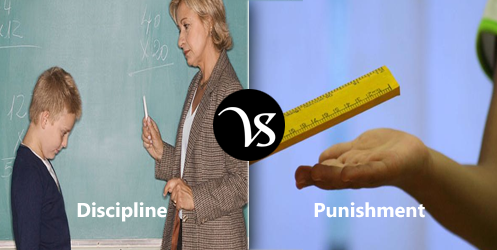 Discipline:
Discipline:
Discipline is guiding children and helping them learn what is expected. Discipline is used to teach and guide. It raises the self-esteem.
Punishment:
Punishment is the part of the process called discipline. Punishment is given when something is done to a person that they don’t like. Punishment is given in order to control the bad behaviors. It sometimes benefits as well as harms.
Differences:
| Basis | Discipline | Punishment |
|---|---|---|
| Definition (www.oxforddictionaries.com) | The practice of training people to obey rules or a code of behaviour, using punishment to correct disobedience | The infliction or imposition of a penalty as retribution for an offence |
| Objectives/Purpose | Discipline is used to teach and guide. | Punishment is used for the purposes of controlling and retribution. |
| Synonyms | Self-control, strictness, regulation, control and limitation | Torture, abuse, retribution, trial and beating |
| Antonyms | Ignorance, reward, negligence, neglect and disorder | Happiness, reward, award, praise and encouragement |
| Types | Its types are:
|
Its types are:
|
| Word origin | The word discipline was originated from Middle English (in the sense ‘mortification by scourging oneself’): via Old French from Latin disciplina ‘instruction, knowledge’, from discipulus. | The word punishment was originated from Late Middle English: from Old French punissement, from the verb punir |
| Consequences | It focuses upon restitution and natural outcome of events. | It focuses on hurting or depriving the child. |
| Inspires | It motivates and encourages doing better next time. | It inspires the anger, resentment, rebellion, revenge or withdrawal. |
| Feelings | It preserves mutual respect of feelings and dignity. | It ignores feelings and dignity of the child. |
| Connection | Parent and child feel good about each other and the relationship. | Parent and child feel disconnected from each other and the relationship. |
| Focus | This focus on what children are expected and allowed to do. | Punishment focuses on past misbehavior and offers little or nothing which help to a child behave better in future. |
| Pronunciation |
|
|
| Self-esteem | It raises self-esteem. | It lowers self-esteem. |
| Struggle | It decreases power struggles, since the needs of parent and child are met. | It increases power struggles, because only the needs of parent are met. |
| Feels | Child feels understood. | Child feels misunderstood. |
| Related | It is related to misbehavior. It is sensible. | It is unrelated misbehavior. It is arbitrary. |
| Advantages/Benefits | Its advantages are:
|
Its advantages are:
|
| Disadvantages | Its disadvantages are:
|
Its disadvantages are:
|
| Example in Sentence |
|
|





